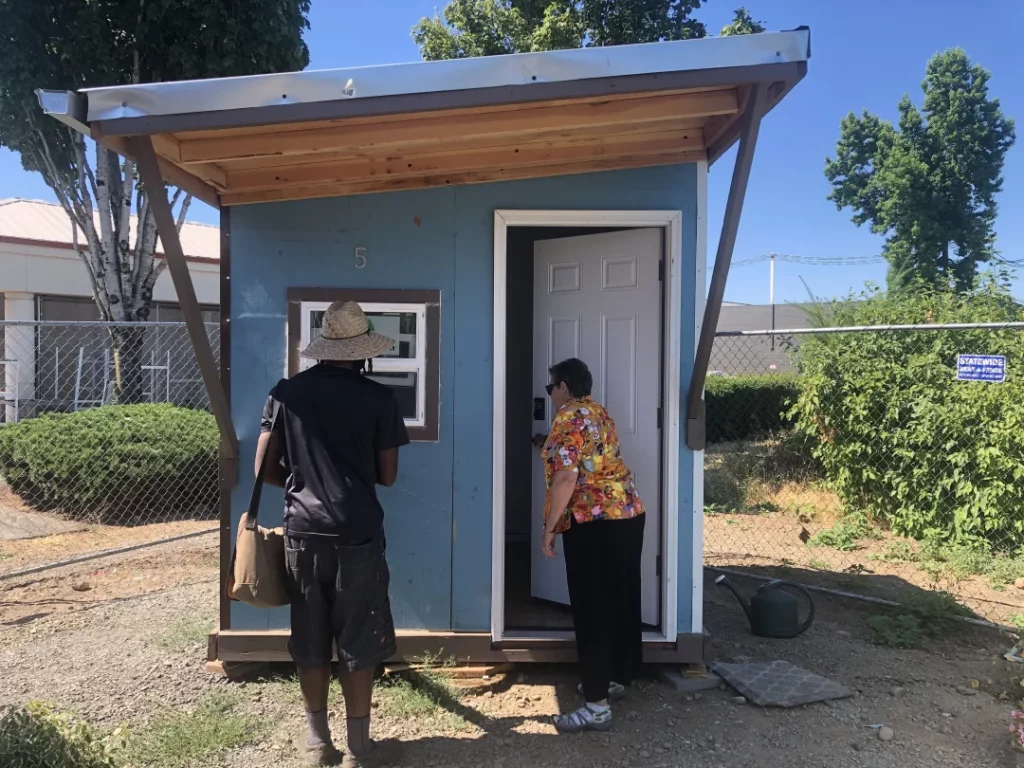But it’s not run by the city.
By Julia Silverman August 15, 2022
Jan McManus and a staff member talk at the new WeShine Village, a few weeks before residents are due to move in.
IMAGE: JULIA SILVERMAN
Getting Portland’s six Safe Rest Villages—intended to provide secure sleeping pods and communal support services for formerly houseless people—up and running has proved to be an agonizingly slow process, with the city regularly blowing past target deadlines thanks to difficulty securing land, environmental concerns and pushback from neighbors.
Meanwhile, a new nonprofit formed in May 2021 and aiming to locate similar villages on privately owned land got its first microvillage up and running in about 15 months. Its first cohort of 10 residents starts moving in next week, onto land owned by the Parkrose Community United Church of Christ off of busy NE Halsey Street and 122nd Avenue.
In the past 15 months, WeShine Initiative executive director Jan McManus says, the group has “had to incorporate, to apply for nonprofit tax exempt status, recruit a board, come up with our mission and values and a business plan, seek property, seek funding, come up with a design for our villages and our sleeping pods and a staffing model.”
WeShine is one of a small but growing number of nongovernmental organizations, often affiliated with churches, that are getting managed villages populated by tiny sleeping pods—complete with locking doors, heat, and electricity, plus rudimentary bathroom and cooking facilities—up and running.
Of course, their mission is on a smaller scale than the city’s. WeShine’s villages are intended for just 10 to 12 residents, instead of the 30 to 60 people for whom there will be space at the city’s efforts. And the funding mechanisms are different, too—the city’s efforts are supported for the time being by federal COVID relief dollars, while WeShine and other private efforts have sought grants from Metro’s supportive housing services program, approved by voters in 2020. McManus estimates that operating a WeShine village serving 10 people will cost about $350,000 a year.
Still, the different trajectories between the city efforts and WeShine’s are stark. Of the six villages that Portland city commissioner Dan Ryan, who oversees the Portland Housing Bureau, had hoped to open by January 1, 2022, only two are currently operational. Another is targeted to open by the end of the summer, and the remainder by the end of the year. Whether that timeline will stick is anyone’s guess, especially since progress updates are sparse.
In a July 22 newsletter from the Safe Rest Villages Program, two of the proposed village locations were getting draft site plans drawn up, another is in limbo while waiting for soil testing results, and officials were working on a plan for “remediative actions” at a fourth, to make the site suitable for temporary use.
Both public and private efforts face some of the same hurdles. McManus says her group’s first challenge was finding property owners willing to let them use space for a supported village—for the city, which is locating its villages on publicly owned property, this has been enough of a challenge that Portland Mayor Ted Wheeler eventually had to issue an emergency proclamation to make it easier for the city to block off land for use as safe rest village sites.
“We look at underutilized parking lots at fast food places, or places that had gone out of business and were fenced off—anything that looked like it could be a potential space.,” McManus says. “We wrote letters, we approached people in person, we tried to use networking to get to people.”
It didn’t work. WeShine was stuck in a bit of a catch-22; potential landlords wanted proof of concept, but the group couldn’t prove that its model would work without a site. (Having built a village in Parkrose has changed that calculus, McManus says: “I do get outreach almost every week now from people saying they’d like to talk to me about a piece of land. I haven’t signed any other leases yet, but I am in conversation about a second site,” she says.)
Churches, though, were already doing some of this work on their own, McManus says, citing Agape Village at Central Nazarene Church in outer Southeast Portland and Beacon Village at Northeast Portland’s Bridgeport United Church of Christ as particular role models. Religious institutions are often already serving meals, or offering showers to houseless people, she says, making them a more likely partner for future tiny-house village locations.
The Parkrose United Church of Christ was struggling with unruly campers on its lot; church members and management wanted to help people, but didn’t want an unsupervised site in their yard, which made WeShine the right fit.
Like the city’s shelters, the Parkrose village will be “low-barrier,” meaning that residents don’t have to pass a background check or agree not to use drugs and alcohol while on site, though WeShine will ask them to sign a “Good Guest” policy. (Priority was given to applicants who identified as LGBTQIA+ and/or were people of color.)
That has been an issue with the city, too, with residents and school officials near villages in SW Portland and along Naito Parkway saying they are concerned about safety and that the presence of the villagers will draw in more tent campers.
MsManus says the hope is that the availability of on-site services will help ensure a safe and stable environment. WeShine has hired a previously houseless person who will live part-time on site as a “village life coordinator” and a peer support specialist, who can help move villagers toward treatment for addiction or behaviorial health issues. The group has also lined up a resource coordinator to help visitors connect to other services, like job training and the search for permanent housing, and hired a maintenance person to focus on cleanliness and security.
McManus and her team are in a hurry. In her perfect world, the city/county Joint Office of Homeless Services would dedicate more money to alternative shelters like hers—though the only a relatively small sliver of Multnomah County’s share of the supportive housing services funding is earmarked for such initiatives. (Tiny-home villages are intended to be transitional, not permanent, housing, but a study from Portland State found that those who were living in such villages were very satisfied with their living situation.)
McManus is already working with a network of other nonprofits to share best practices, including designs for how to build a sleeping pod and what kind of on-site services to provide. The sleeping pods at the WeShine Village are wood-framed, simpler and less expensive than the converted shipping containers that have been used at some other locations.
While she’s dreaming, she’d like more faith communities to host temporary tiny villages, as well as developers who are waiting for commercial permits and financing to come together, businesses with underutilized parking lots, and more.
“We try to offer inducements, to pay a modest lease payment, to insure the land, and protect the land from other vandals and crime—and you’re doing a community service! So sign up, join us, give us a lease,” she says.

